Original | Odaily Planet Daily
Author | jk
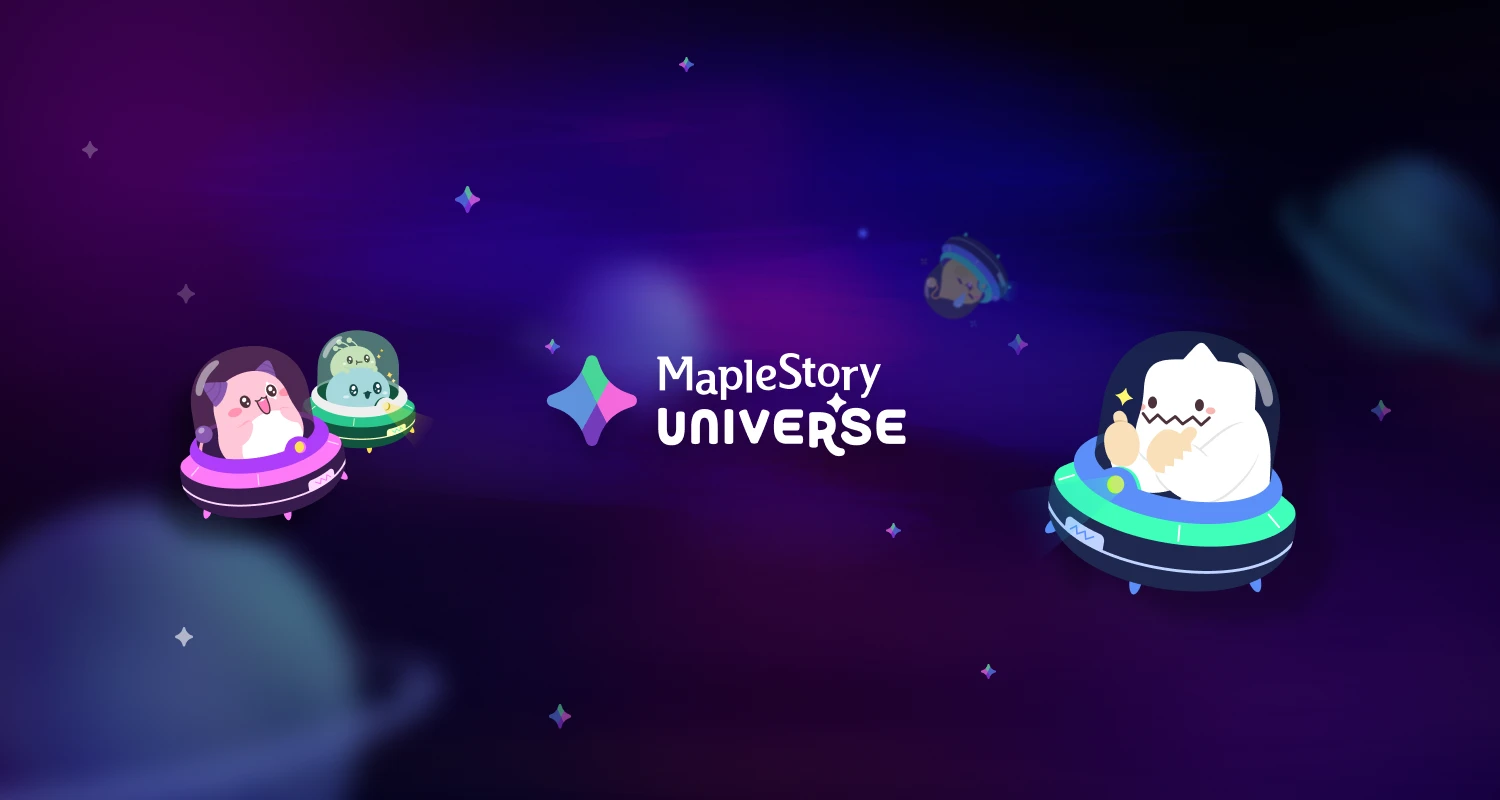
In the rapid development of the Web3 gaming industry, how to combine classic IPs with the unique mechanisms of Web3 has become a challenge for Web2 games transitioning to this new era. The game IP "MapleStory," with over 21 years of history, is no exception: this IP established a unique brand image during the Web2 era and is now preparing to step into the Web3 realm.
Odaily Planet Daily is fortunate to interview the team behind "MapleStory Universe," a Web3 ecosystem based on the "MapleStory" IP supported by its parent company Nexon. They shared their journey and innovative thoughts during the development of "MapleStory Universe." Team members reminisced about unforgettable moments during internal testing, reflecting on how the implementation of the new economic system allowed them to relive the fun and nostalgia of early gaming. It is this love for the essence of gaming and a deep understanding of player experience that drives them to explore how to create a truly fun Web3 game through Web3 elements.
Here is the complete interview:
Keith:
Hello everyone, I am Keith, today’s guest for the interview. I am the strategic head of "MapleStory Universe" and have been part of this team since the project's inception. I am a lifelong "MapleStory" player. I work in Nexon's Intelligence Lab, which is responsible for handling all big data, artificial intelligence, and game operation tools related to Nexon IP. Specifically, I joined this project as a member of the strategic team, and now I lead this team. I am happy to answer any questions you may have today.
Odaily:
Thank you, Keith. Let’s get started. I believe everyone is quite familiar with "MapleStory" as a Web2 game. Can you introduce "MapleStory Universe" to give our Web3 audience a deeper understanding?
Keith:
Of course! In the Web2 era, "MapleStory" is a massive IP with over 21 years of history, boasting over 250 million user accounts and 6.7 million monthly active users. It is an important IP that leads Nexon's gaming business in Web2. The reason we are bringing "MapleStory" into Web3 is that we want to diversify our user base and redefine how users interact with this IP.
Traditionally, the definition of a player is someone who sits at a desk, uses a keyboard and mouse, downloads a game, and spends hours playing. This is a significant commitment today. We also realize that the definition of a player has changed through platforms like Twitch and YouTube. These platforms have transformed and expanded the player base by making many games watchable rather than requiring active participation. You don’t have to sit at a desk to be an actual player; by watching games, you are still interacting with them, especially in the context of the rise of esports streamers.
We believe that by leveraging some Web3 elements, such as item exchanges and the capabilities of smart contracts, we can redefine our audience and how people engage with the "MapleStory" IP.
Therefore, we are using a token called NXPC to enable this expanded definition of players to interact with the "MapleStory" IP and enhance content creation. Now, content is not only developed and incubated by Nexon; through this token, we incentivize everyone who contributes to the "MapleStory Universe" community. We are measuring the contributions of everyone involved in the gaming community and genuinely motivating them to build on our beloved IP.
Basically, we are redefining players, expanding it to a new perspective where you don’t have to sit at a desk for hours playing "MapleStory." Through Web3 elements, you can own and participate in assets within the "MapleStory" ecosystem. At the same time, we encourage contributors and developers to participate and contribute to the "MapleStory" community through a token incentive system. This is a high-level overview of what we are building in the next phase.
Odaily:
Based on this, how do you view the current state of the Web3 gaming market? What pain points need to be addressed, and how is "MapleStory Universe" responding to these issues?
Keith:
We did not start this project with issues related to Web3 gaming in mind. We have our own definition of Web2 issues, which is sustainability. About twenty years ago, we pioneered the free-to-play business model. This model has been hugely successful, leading to exponential growth for many games, which is fantastic.
However, in this free-to-play business model, the rights to issue assets are often centralized, relying on game providers to create new items. We believe that controlling the issuance of assets through market dynamics can improve this. That’s why we have been exploring different ways to achieve this, and we realized that blockchain is a very useful tool for market-driven asset issuance.
So, that is the problem we aim to solve, based on our experience in Web2. Regarding the current state of Web3, I think the biggest issue is the lack of entertainment value—at least not enough to attract players who pay for entertainment to enter and make the ecosystem more vibrant and sustainable. I believe we have not yet reached this goal, which could be due to various reasons. There are also compliance issues, and the existing tools in the Web3 blockchain are still immature; user experience is also lacking.
I see many Web3 developers working hard to improve user experience, and some teams are creating entertaining content to attract actual players from Web2. I think this is a positive direction.
Odaily:
Can you talk about the current stage you are in and what the future roadmap looks like?
Keith:
Sure. We started building this project about three years ago, in November 2021. Throughout this process, we have gone through many experiments, adjustments, and changes in ideas. So far, we have learned a lot. Recently, at the end of July and the beginning of August, we conducted a closed beta test called the Pioneer Test, inviting about 1,000 players to test our game. The results were outstanding, and the feedback was very positive. During this period, our daily active users (DAU) reached 714, with nearly 92% of testers participating throughout the 10-day testing period. The overall retention rate of the test reached 82%, exceeding the industry average. Additionally, there were over 190,000 transactions during the test, proving a sustainable in-game ecosystem.
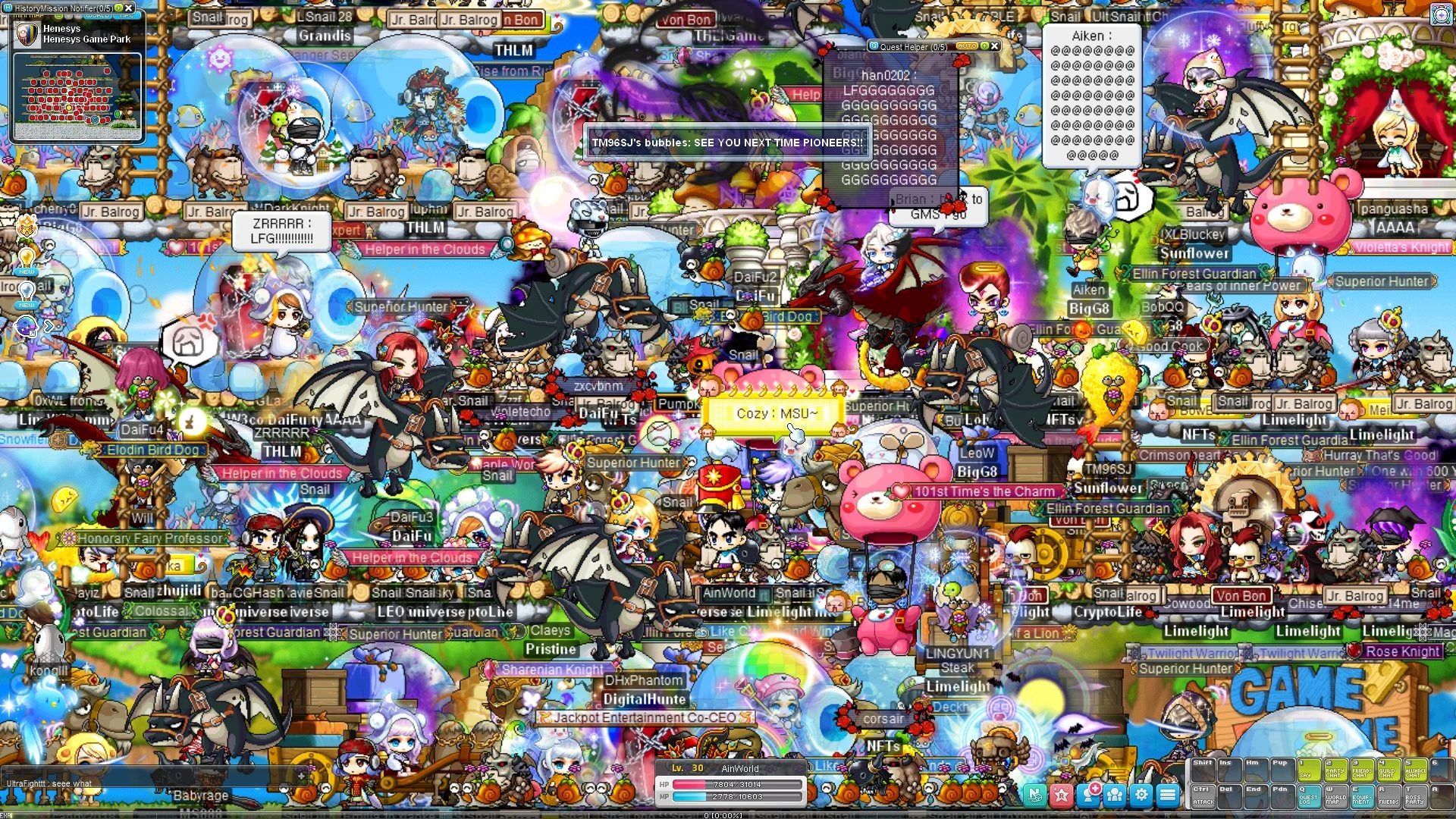
Screenshots from the Pioneer Test
We are now polishing the final steps of development while also preparing to launch the second round of testing soon. We hope to be ready to officially showcase our product to the market by the end of this year or early next year.
Odaily:
Thank you. So, will the next important milestone be the game release, or something else?
Keith:
We will soon conduct an open beta test, which I believe is our next major event. Following that, we look forward to a grand product launch, possibly by the end of this year or early next year.
Odaily:
Thank you. I know the team conducted a large-scale financing round at the end of last year—$100 million, right? How will these funds be allocated, and how do you plan to use them?
Keith:
Yes, last year we did receive $100 million in capital from our parent company Nexon. The nature of this round is different from the typical venture capital funding that other projects usually go through; this $100 million comes from our parent company, demonstrating their commitment and confidence in our Web3 experiments with "MapleStory Universe." We believe this represents a new business model for the future.
We are allocating most of the funds to ensure the delivery of high-quality products to the market. We do not have the pressure of short-term profitability; instead, this commitment allows us to focus on long-term development and sustainability.
I think this approach is very different. We did not conduct a public venture capital or institutional investment round; rather, this was a very private round conducted internally at Nexon. We are using all this funding to build a high-quality product with long-term incentives. Additionally, perhaps next year, we will seek to expand our presence in the Web3 community, possibly through investments and incubating developers who can build and contribute to our game community within our universe.
Odaily:
You mentioned allowing developers to create and develop within the universe. How is this specifically achieved?
Keith:
Exactly. Even in the Web2 "MapleStory" community, we have seen many developers building on the existing "MapleStory" foundation, even without these incentives. For example, Maple.gg is one such case where they use our open API to obtain real-time data, making search and statistics easily accessible to users. This data is very useful for players; it is important information that needs to be provided. However, if we were to build all these tools and products outside of game developers, it would be very slow. We wouldn’t be as flexible as external developers who can create their own products. We believe that when these developers are incentivized and properly compensated, they can join our gaming community more quickly and create more entertainment value for our players.
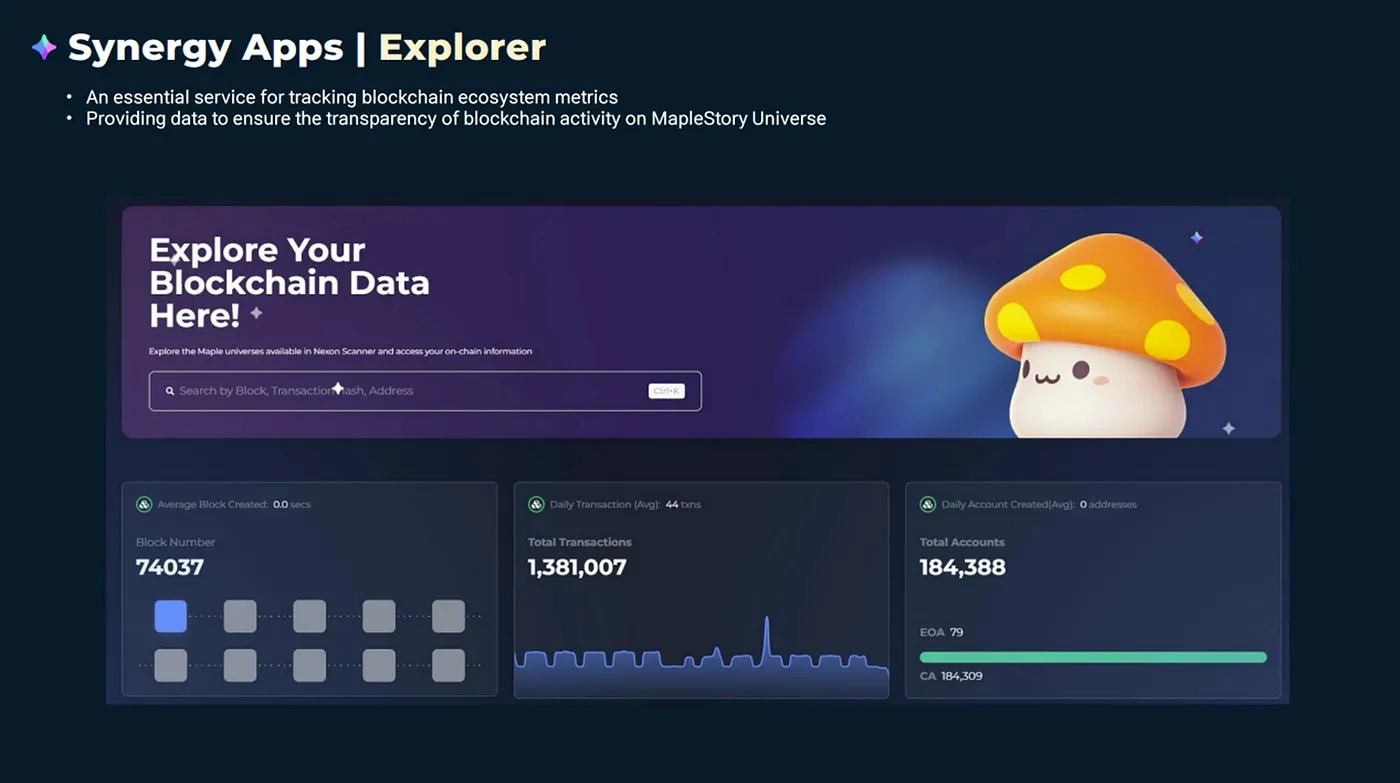
Data services set up for developers in "MapleStory Universe"
We provide many APIs that allow developers to obtain API keys and start building their products. I think the only limit is their imagination. At the same time, we see many developers achieving great success on a platform called "MapleStory World," where we provide the "MapleStory" assets accumulated over the past 20 years. They are using these assets to create games. For instance, games like Artale or Maple Land have over 100,000 concurrent users. They have made significant contributions and profits through their efforts. This is the direction we envision moving forward: decentralizing content creation through developers, while we incentivize these contributions.
Odaily:
I want to delve deeper into this. You just mentioned that both developers and players will be incentivized, right?
Keith:
Oh, yes. Our main incentive protocol focuses on contributions, and currently, we are primarily focusing on developers. We incentivize players in a way that is different from developers. Developers will be evaluated based on various metrics and logs that we collect. Developers can create a wide range of products—from web search engines to DAOs, communities, Web2 communities, games, mobile games, role-playing games, or first-person shooters, etc. We will have different metrics to assess various contributions to the "MapleStory Universe" community.
The core standard we will focus on is creating demand for in-game assets, such as the NFTs we issue. I believe this is a key metric for providing entertainment value to players, as it will drive demand for in-game assets (like NFTs). This will be the main evaluation criterion for developers in our ecosystem. For players, we do not use a contribution scheme to compensate them; instead, when players play the game, we will use the NXPC token to issue items and reward them for their adventures in the game. Therefore, we are considering two different incentive paths.
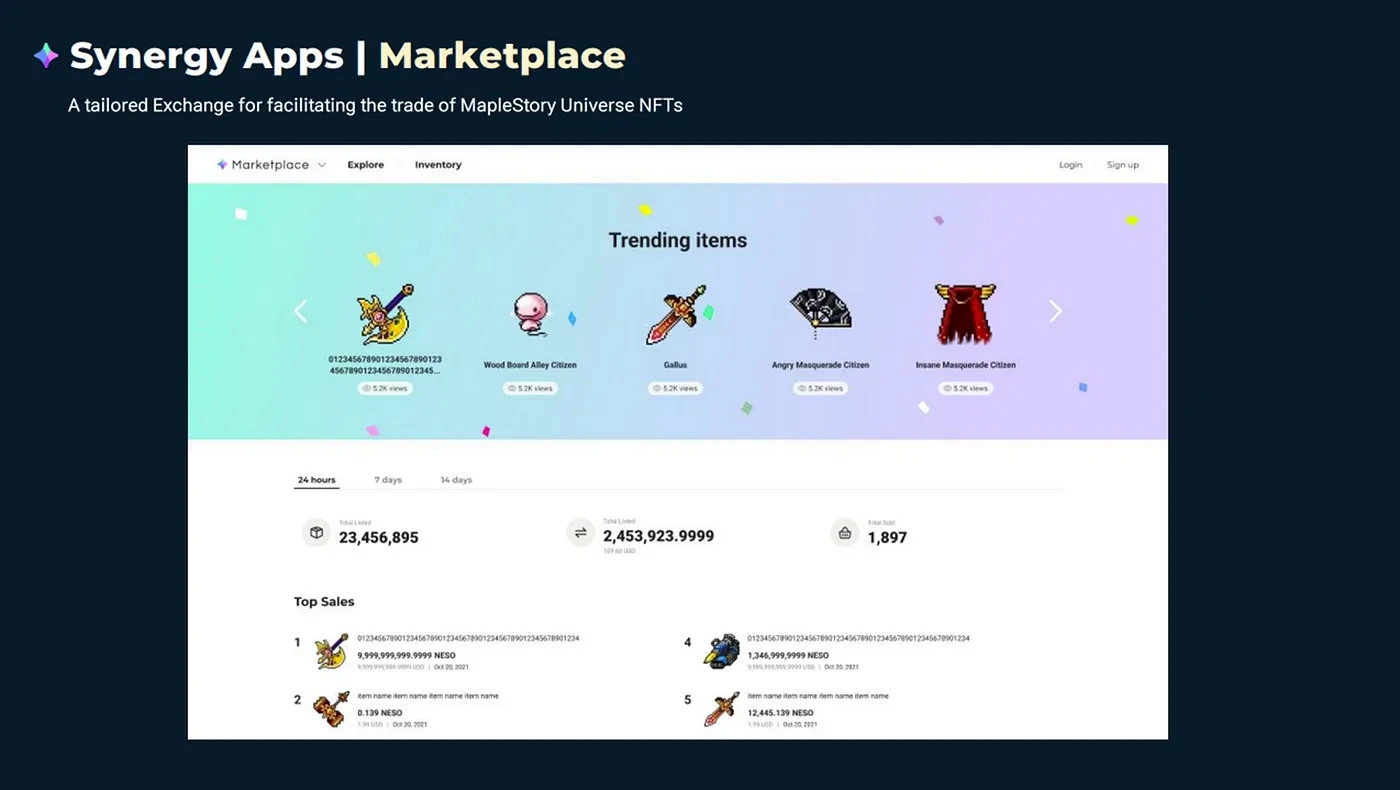
Market within "MapleStory Universe"
Odaily:
The next question is about the community. The community has always been a love-hate relationship for project developers in the Web3 space, as it is challenging to balance the interests of each participant. Some are purely players, some are developers, and others are investors interested only in certain aspects. How do you view the roles of players and other community members (such as token investors), and how will you balance the interests of these different parties?
Keith:
Yes, I think this is a very critical issue. Even in Web2, balancing the interests of different players has been a challenge. When we say "players," there are actually different subcategories. Some players spend a lot of money to gain an advantage in the game, while others are very casual. Balancing our player base in the game has always been a challenge in Web2. In Web3, we also include participants from the Web3 ecosystem who may not be players, such as token investors and speculators.
Our token economics, particularly the NXPC token, corresponds to the power of decentralized asset issuance, which developers will obtain. When I say developers, I include ourselves. Our contributions to this ecosystem will also be evaluated, and we will earn tokens based on our contributions to the "MapleStory Universe" ecosystem. Therefore, we are also participants.
The consistency of interests among different parties is crucial. Rewarding experiences is very important for players. To enhance this rewarding experience, it is essential to ensure that what you gain from the game is valuable. For example, if you spend an hour exploring a dungeon and the items you obtain have no value in the community, then the rewarding experience will diminish. Everything, starting from the NXPC token, represents the right to decentralized asset issuance, will be listed on centralized exchanges, and will have a market price. This price essentially reflects the cost of issuing items, which is the creation cost of the assets we provide to players.
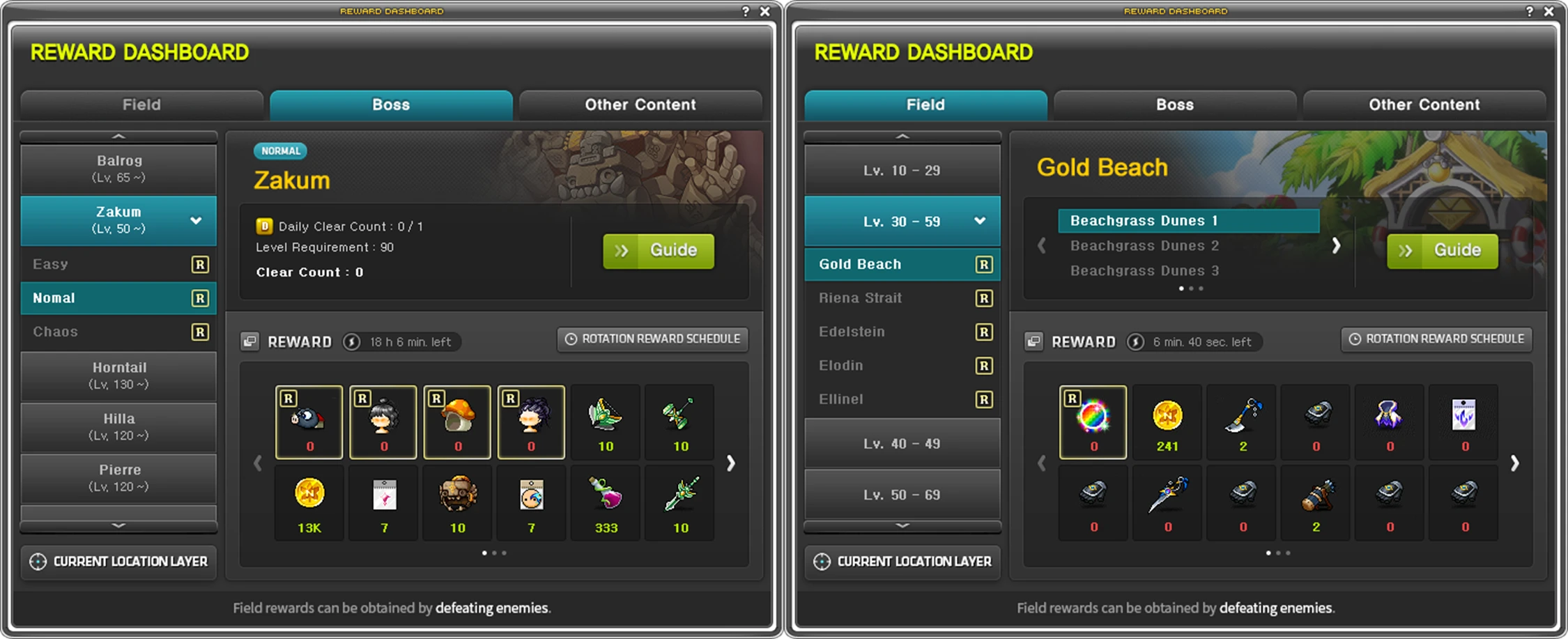
Reward panel of "MapleStory Universe"
We want to ensure that the price of this token is valued by the community and the market. I believe this will align the interests of token investors, speculators, and general users of Web3. As developers, I also want to receive valuable rewards for my contributions to the community, so I hope the value of the token can increase. Players also want to receive valuable rewards for their efforts. I think everyone involved in the "MapleStory" ecosystem is working towards a common goal: we want the price of the token to be valued by the community. If the token is valued, then the players' rewarding experience will also be high. I have spent a lot of time ensuring that all participants in our community have aligned interests, and I believe this is a key aspect of our design.
Odaily:
Besides that, what has been the biggest challenge you faced in building the entire "MapleStory Universe"?
Keith:
When I started building this project in 2021, our initial goals and expected release dates were quite "ambitious." We did not fully understand what it meant to build a Web3 game or to transition a Web2 IP to Web3. I thought it would be simple, like about ten years ago when PC desktop game developers transitioned their IP to mobile versions. Everyone thought it was easy, but doing so was actually a completely different challenge that required a completely different level of skills. I think we have gone through a similar cycle in Web3.
I realized that transforming a popular Web2 IP into Web3 involves building a service platform, not just a game. We see many of our Web2 peers, other game companies, trying to transition their Web2 services and IP to Web3, but in many cases, they encounter difficulties adapting to this new environment.
Creating a service and platform to facilitate all these different participants and ensuring that the incentives for all parties are aligned in this new market is crucial for the success of our Web3 experiment. There has been a lot of learning in this process. We thought we were experts, but we realized that there is a completely different effective way in Web3. We had to make multiple adjustments. As I mentioned earlier, we had to learn and relearn new things and let go of past practices. This has been a huge challenge for everyone on our team, and I think all teams trying to adapt to new languages, new practices, and new best practices are facing similar challenges. It requires a lot of learning and is entirely different from building in Web2.
Odaily:
We hope to discuss some truly novel content about "MapleStory Universe": I saw that you participated in the Token2049 event. How was that event? Was there anything fresh or memorable that you can share?
Keith:
The "new" you mentioned is about how "MapleStory Universe" differs from traditional "MapleStory" in terms of economic design. This is completely different. We had to learn how real-world economies work and bring that into our virtual world, creating entirely new rules for these economies. For example, the biggest change is that we do not have a cash shop, which is the main business model in Web2. We also do not sell anything at fixed prices. Instead, we allow market dynamics and real-world economic principles to integrate into our gaming experience.
If you have played our game, you will notice that the prices of item enhancements change based on user demand. If there is no demand, the price is close to zero, almost free. Conversely, if there is high demand for a certain enhancement, the price will gradually increase based on demand.
These new concepts align very well with Web3, and we believe this approach is more sustainable. Everything must be sold at prices determined by market dynamics. We have integrated these market-driven concepts into various aspects of our game, which will provide players with a new experience in "MapleStory Universe."
Our team had over ten members attend the Token2049 event in Singapore, just like last year. I participated in a panel there, and being able to meet vibrant and passionate developers focused on the future and innovative ideas for developing new technologies is always inspiring. We also held our own side event at Token2049, and many people showed interest in our game. For me, a memorable moment was when someone next to me realized I worked on "MapleStory Universe" and shouted at the party: “If 'MapleStory' fails in Web3, I’m quitting blockchain! You need to prove that actual mass adoption is achievable.” This resonated with me deeply. I felt a strong sense of mission, driving me to work harder and more thoughtfully to ensure we are ready to welcome a large number of players to "MapleStory Universe"—not just because it is blockchain-based, but because it is fun. The experience in Singapore was fantastic.
At the side event, we originally expected a few hundred people, but over 350 showed up, exceeding our expectations. The crazy part was that people were reluctant to leave. The venue we rented was quite large, but it was so crowded that I could hardly have a conversation. I had to step outside to talk better.
Odaily:
During the development of "MapleStory Universe," do you remember any particularly interesting stories?
Keith:
I think there are many. Let me think. One of the incredible moments during our development of "MapleStory Universe" happened during our first internal testing. In an early internal test, we had a version that included the new economic system.
Then, we encountered a problem: we realized we weren’t really working; most of our time during that period was spent playing the game because we found it too fun. It evoked a lot of nostalgia about the early version of "MapleStory," when you had to really grind, spending hours in the fields fighting monsters to obtain items. The rewarding experience of finally getting the good items you had been striving for after hours of gameplay is something I have always felt was missing in the current "MapleStory."
The dynamics of "MapleStory" have changed significantly, and this experience made many team members and me feel nostalgic. We ended up playing in the office for several hours, and no one was really working; we were all just playing. It was an incredible moment, we realized that if 100 team members, all lifelong "MapleStory" players and IP enthusiasts, found it fun, then our players would like it too.
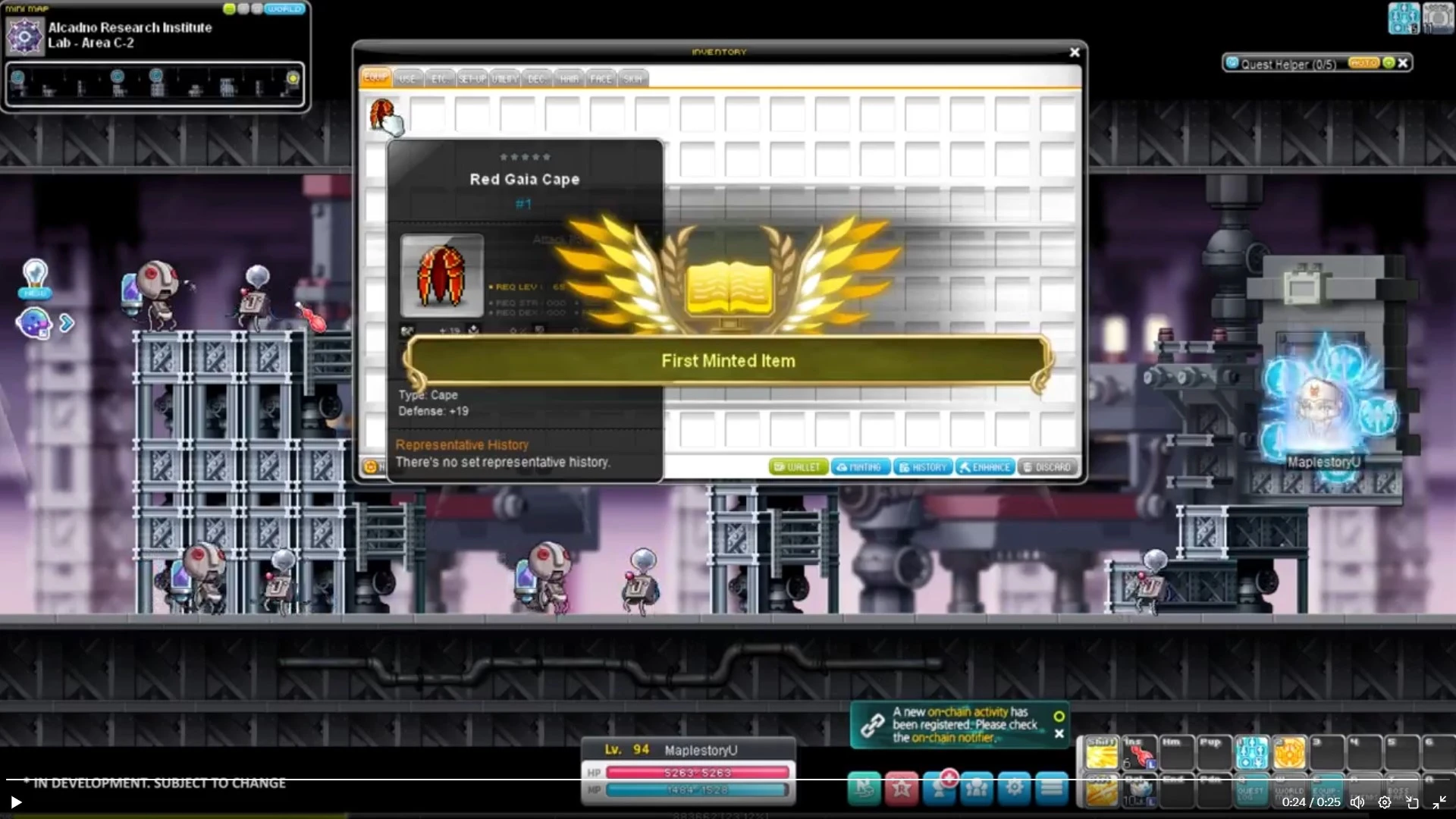
Screenshots from "MapleStory Universe"
This is a very interesting part of our development process.
Odaily:
The next question is more of a Yes or No question: Do you think "MapleStory Universe" or this team is crypto-native?
Keith:
I believe we have struck a good balance between crypto-native team members and traditional Web2 developers. Both aspects are essential in ensuring we create high-quality products. We have recruited quite a few new members from Web3 who are DeFi enthusiasts, NFT collectors, and so on, while also bringing in traditional developers who understand how to create stable games that meet player expectations. Therefore, I believe we have a very good balance.
In Web3, capturing core principles, such as economics, is crucial. You cannot create value out of thin air. For these core concepts, you need a solid foundation in traditional markets, traditional economics, and traditional finance. We have quite a few team members who are well-versed in these principles and have been building virtual worlds for the past 30 years. When these combine with our crypto-native team members, significant synergies occur.
Odaily:
That's impressive, thank you very much for your answers. Do you have anything else you would like to add or discuss?
Keith:
Maybe the last thing I want to say is, I am a lifelong "MapleStory" player. I have almost killed every monster that exists in "MapleStory." I am a very passionate and serious "MapleStory" player, and in the past three years of project building, I have focused on ensuring that this "MapleStory" will be fun. I believe this is one of the biggest goals of other game developers: to ensure that the game is actually fun and enjoyable, providing entertainment value for players. I think this is the only sustainable way to ensure success, whether in Web2 or Web3.
This is why I believe we will achieve widespread adoption among players. Initially, they may face barriers in Web3, such as dealing with wallets and other complexities. However, as developers work to improve the Web3 experience, this situation will improve. Ultimately, they will realize that our game is very fun, and we can attract millions, even tens of millions of users to join our community. This is my goal and ambition.
免责声明:本文章仅代表作者个人观点,不代表本平台的立场和观点。本文章仅供信息分享,不构成对任何人的任何投资建议。用户与作者之间的任何争议,与本平台无关。如网页中刊载的文章或图片涉及侵权,请提供相关的权利证明和身份证明发送邮件到support@aicoin.com,本平台相关工作人员将会进行核查。



